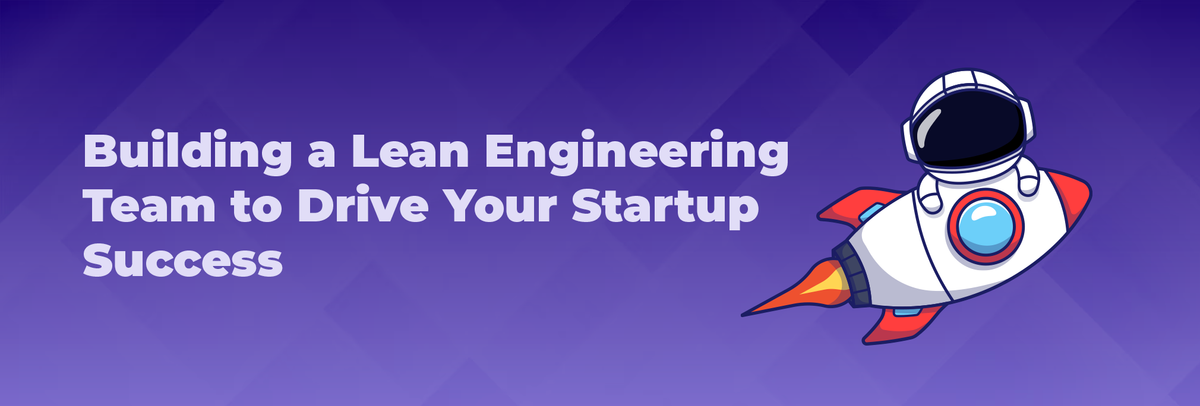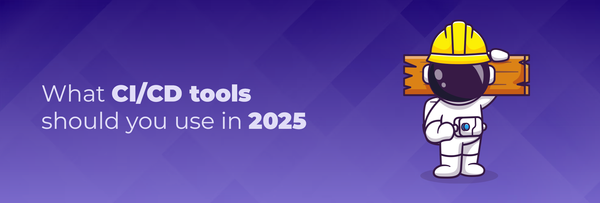Building a Lean Engineering Team to Drive Your Startup Success

Startups often find themselves in a high-stakes race, juggling innovation with tight budgets and rapid timelines.
The burning question is: how can they build powerhouse engineering teams without breaking the bank or slowing down progress?
This blog provides the answer by revealing the secrets behind lean engineering teams.
Together we’ll figure out how to craft a nimble, cost-effective team that doesn’t just keep pace but leads the charge in your industry.
If you’re grappling with scaling your tech capabilities or maximizing efficiency, our guide offers the blueprint for turning lean principles into startup success.
Without further ado, let’s get started and make your startup a success.
Building Efficiency: The Lean Engineering Team Advantage
What is a Lean Engineering Team?
In the startup ecosystem, a lean engineering team optimizes resource utilization to achieve maximum impact with minimal expenditure.
Just as a lean startup strives to extend its operational runway and maximize success without excessive spending, a lean engineering team follows suit.
This team focuses on an expertise-first approach, ensuring each engineer delivers higher throughput compared to average engineering teams.
It is meticulously structured to meet specific business needs without overburdening or underutilizing team members, striking a perfect balance between cost-effectiveness and optimal delivery.
Why is a Lean Engineering Team Crucial for Startup Success?
Table 1 outlines the key reasons why having a lean engineering team is essential for startup success.
Lean vs. Large: Why Smaller Engineering Teams Outshine
Table 2 compares the benefits of a lean engineering team to those of a larger, more diverse team.
Hiring and Team Composition for a Lean Engineering Team
When building a lean engineering team, selecting the right individuals and structuring the team effectively are critical for success.
Here’s how to approach hiring and team composition to ensure a well-balanced and high-performing team:
Prioritizing Criteria for Hiring
- Experience Level: Focus on mid to senior-level engineers (staff engineers) who bring substantial expertise and autonomy to the team.
- Skill Balance: Look for candidates who combine strong technical skills with excellent soft skills to foster collaboration and effective communication.
- Relevant Background: Ensure candidates have the experience that aligns with the dynamic needs of a startup environment.
- Workload Fit: Match candidates’ capacities with the expected workload to prevent overburdening or underutilization.
Ensuring a Good Fit
- Communication Skills: Prioritize candidates with outstanding communication abilities to maintain clarity and reduce misunderstandings.
- Peer Interviews: Use peer interviews to assess compatibility and filter out potential mismatches.
- Technical Discussions: Incorporate high-level engineering discussions in the interview process to evaluate the depth and breadth of their knowledge.
- Mock Scenarios: Test candidates with mock scenarios to gauge their systematic problem-solving approach and critical thinking skills.
- Experience: Target engineers with at least 5 years of experience. Avoid hiring junior engineers until you have the resources to train them and robust engineering processes in place.
Balancing Skills and Expertise
- Define Primary Goals: Clearly outline the objectives of product development to ensure alignment across the team.
- Consult Engineering Leads: Work with engineering leads and system architects to identify technical challenges and workload needs.
- Draft Required Positions: Based on your goals, create a list of essential positions needed to achieve success.
- Develop Workflows: Build efficient engineering workflows and pipelines, incorporating automation where beneficial.
- Leverage External Expertise: Consider consultants or firms specializing in engineering outsourcing to complement your team.
- Benchmark and Adapt: Study lean teams from successful companies and adopt their best practices.
- Hire Senior Resources: Start with key senior hires to build a strong foundation, scaling resources as needed.
- Monitor Metrics: Define and track key performance metrics to ensure high-quality delivery.
- Scale Wisely: Adjust team size based on budget and project timelines, scaling up when necessary.
- Seek Expert Assistance: Engage specialized firms like Teamo, Toptal, and A-Team for top-quality talent suited to your needs.
- Manage Tasks Efficiently: Balance workload and delivery times to prevent burnout and ensure efficient task completion.
By focusing on these criteria and strategies, you’ll build a lean engineering team that is agile, skilled, and perfectly aligned with your startup’s goals.
Optimizing Processes and Methodologies for Lean Engineering Teams
Methodologies
Key Principles
Effective Implementation
Quick Check: Boosting Team Culture and Collaboration
Fun Fact: Did you know that fostering a culture of collaboration and continuous improvement in a lean engineering team can be both strategic and fun?
Gallup research shows that employees who feel their work environment supports collaboration are 5 times more likely to be engaged with their work.
To keep your team dynamic and engaged:
- Establish Short Feedback Loops: Rapid feedback helps everyone stay aligned and improves project outcomes.
- Hire for Talent and Team Chemistry: Prioritize both high skill levels and the ability to work well with others—skills alone aren’t enough if collaboration suffers.
- Emphasize Effective Communication: Use async tools like Slack, ensure regular standups, and embrace virtual coworking sessions to keep everyone in sync.
Maintaining high morale is a team effort. Embrace these practices to ensure your lean team not only meets its goals but enjoys the journey along the way!
In conclusion, building a lean engineering team is a strategic advantage for startups aiming to innovate swiftly while maintaining cost efficiency.
The most successful startups share a common trait: they focus on hiring experienced engineers who possess both technical and soft skills, ensuring high productivity and effective collaboration.
Understanding the startup timeline and addressing startup issues from the beginning are crucial steps toward a successful start.
Prioritizing clear communication, streamlined processes, and a well-defined workload helps in maximizing output and reducing mental overhead.
Adopting agile methodologies like Scrum and Kanban facilitates efficient feature development and maintenance.
Additionally, leveraging modern development tools and fostering a culture of continuous improvement and collaboration enhances team engagement and performance.
A startup company will most likely encounter challenges, and knowing what happens when a startup fails can help mitigate risks.
Successful startups often navigate these startup problems by staying agile and adapting quickly to changes.
By following the principles and strategies outlined in this guide, startups can avoid common pitfalls and become startup company's examples of success.
It’s essential to recognize that some small business ventures fail for the following reasons: lack of clear goals, poor team composition, and inefficient processes.
Additional reasons for the failure of some small business ventures include inadequate market research and insufficient funding.
Understanding why entrepreneurs fail and how long it takes to be an entrepreneur can provide valuable insights for those starting their journey.
Ultimately, a lean engineering team is not just about doing more with less; it's about optimizing every aspect of your engineering operations to stay competitive and agile in a fast-paced market.
Embrace these practices, and watch your startup not only keep pace but lead the charge in innovation and growth.
By doing so, you’ll join the ranks of the most successful startups and ensure that your business takes off successfully, addressing any startup problems along the way.
Grow Fearlessly with Your Superteam of 10x Talent
Building a lean engineering team is crucial for your startup's success, and Teamo is here to help you achieve that seamlessly.
Boost your business with Teamo's cutting-edge talent solution!
Access top-tier, pre-screened software developers from emerging markets, seamlessly integrated as remote powerhouses in your development team.
- Seamless Integration: Our developers blend effortlessly into your existing workflows, ensuring a smooth and efficient transition without disrupting your ongoing projects.
- Fast And Affordable: Get your projects off the ground quickly and within budget. Teamo provides rapid deployment of skilled developers, saving you time and money while maintaining a lean team structure.
- Extensively Vetted: Each developer is rigorously screened to meet the highest standards of expertise and reliability, guaranteeing that you receive only the best talent available.
With Teamo, you can confidently build a lean, efficient engineering team that drives your startup's success.
Turn your vision into reality with the power of 10x talent and lead the charge in your industry!
FAQs
- What is the most common trait successful startups share?
The most common trait that successful startups share is the ability to build and maintain a lean, efficient engineering team.
This approach allows them to stay agile, minimize costs, and maximize productivity.
By focusing on hiring experienced engineers who bring both technical expertise and strong soft skills, these startups can navigate common startup issues and avoid the pitfalls that cause some small business ventures to fail.
- How long does it take for a business to take off, and what happens when a startup fails?
The time it takes for a business to take off can vary widely, but generally, it can take anywhere from a few months to a few years to see significant growth and success.
Understanding the startup timeline and being prepared for potential startup problems is crucial.
When a startup fails, it is often due to reasons such as poor team composition, lack of market fit, and inadequate funding.
Learning from these failures and addressing these issues early on can help prevent similar outcomes.
- Why do entrepreneurs fail, and what are some startup examples of success?
Entrepreneurs often fail due to a combination of factors, including inadequate market research, lack of clear goals, poor team dynamics, and inefficient processes.
Additional reasons for the failure of some small business ventures include insufficient funding and failure to adapt to market changes.
However, there are many startup company examples of success, such as those that prioritize building lean engineering teams, focusing on customer needs, and staying adaptable to start up trends.
These startups demonstrate that with the right strategies, a successful start and sustained growth are achievable.




